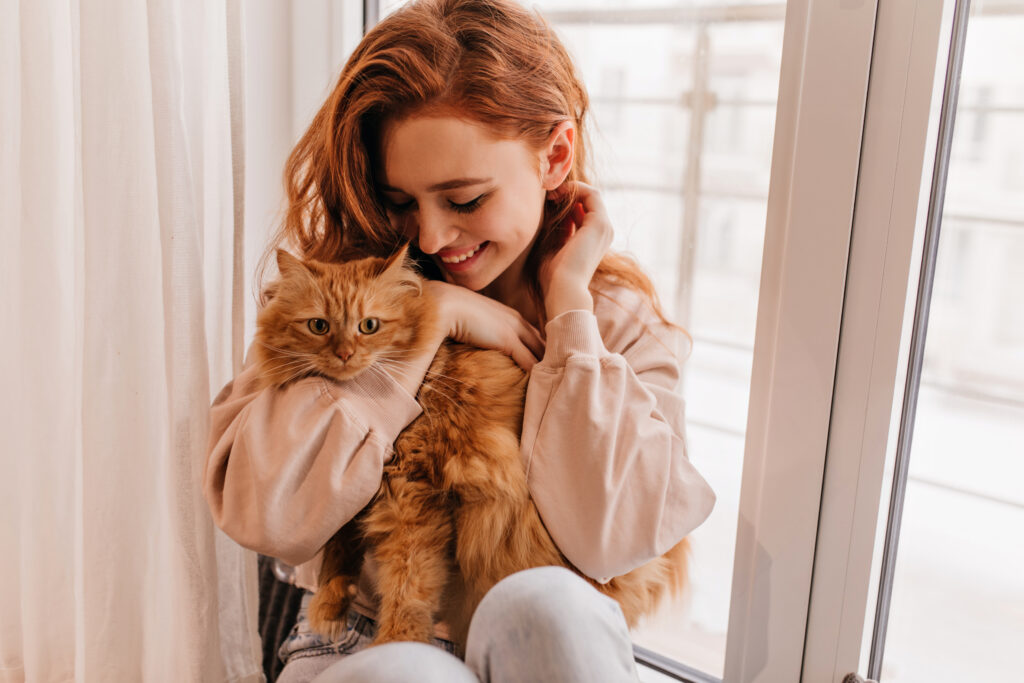
Some cats enjoy hugs and big displays of affection, depending on how open their human parent is to it.
©Look Studio/Shutterstock.com
Cats are the second most common pet in America because they make great companions. They have multiple ways of showing affection, as well as methods of irritating their owners to get attention. Every cat owner knows that their cat rules the roost, as felines have had attendants throughout history.
After a few years, a cat may start imitating their owner. They might make sounds when they get up or lie down, use the bathroom in the morning at the same time as their owners, or prevent their human from sleeping in on days off.
People say imitation is the highest form of flattery, but why do cats imitate humans? Do they know they are not people? What compels them to follow our schedules or mimic our sounds?
Why Do Cats Mimic Humans?
Cats are intelligent animals that have been shown capable of recognizing emotions and solving problems to achieve a goal. Various studies show cats are as intelligent as a two-year-old, similar to most dogs. While intelligence is measured differently between cats and dogs, cats instinctively learn from their surroundings to provide them with the best chance of survival.
So, the question remains, why do cats mimic humans?
Essentially, cats mimic their owners for a few reasons:
- Familiarity and affection
- Instinctive learning
- Routine
- Effective Communication
Showing Affection and Familiarity
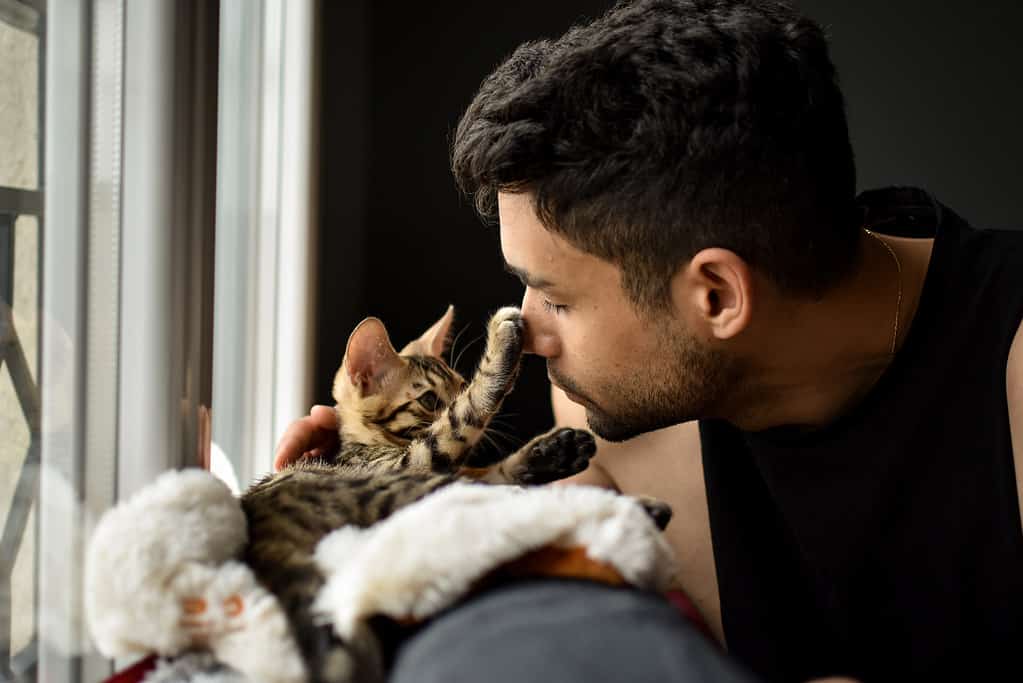
Kittens actively play with those around them to see how their hunting skills match up to their opponent’s.
©Raphael Angeli/iStock via Getty Images
Indoor cats are basically adult kittens. Because these cats do not need to hunt for food, they see their humans as surrogate parents. All children will adopt traits from their parents.
Imitating their owners is a sign they feel comfortable with their human. They see you as someone to keep them safe and protect them like a parent would. By mimicking the traits and habits of their owners, they are showing they deeply care. Studies show cats replicate traits like extroversion, openness, neuroticism, and emotional stability.
Instinctive Learning
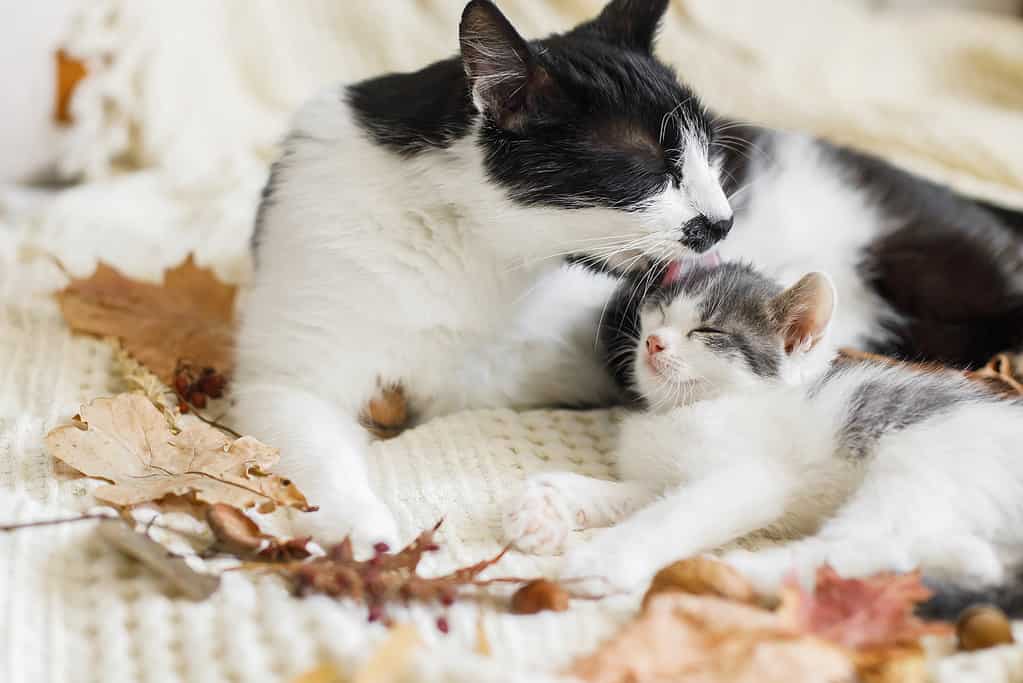
Kittens learn from their mothers how to adapt to the outside world.
©Bogdan Kurylo/iStock via Getty Images
Aside from showing love, cats are animals of instinct. Starting from an early age, cats learn from their mothers how to groom themselves, hunt, and cover their tracks after using the bathroom (or using a litter box). Kittens are rambunctious balls of energy with tiny, sharp nails and teeth. They need guidance on how to use that energy effectively. Mother cats teach their kittens the majority of their life skills in the first few weeks of life, so they may learn to fend for themselves in the wild.
On the other hand, indoor cats see their humans as surrogate parents. Aside from expressing love for their parents, cats will also mimic actions, assuming it is how they should act. They will watch how their humans interact with objects around them and learn to do similar things.
Cats will even imitate their siblings as a means to get more attention. Videos online show cats making sounds similar to a crying baby because they recognize the infant gets attention and food when they make crying sounds. Humans are easy to train, after all!
Routine and Scheduling
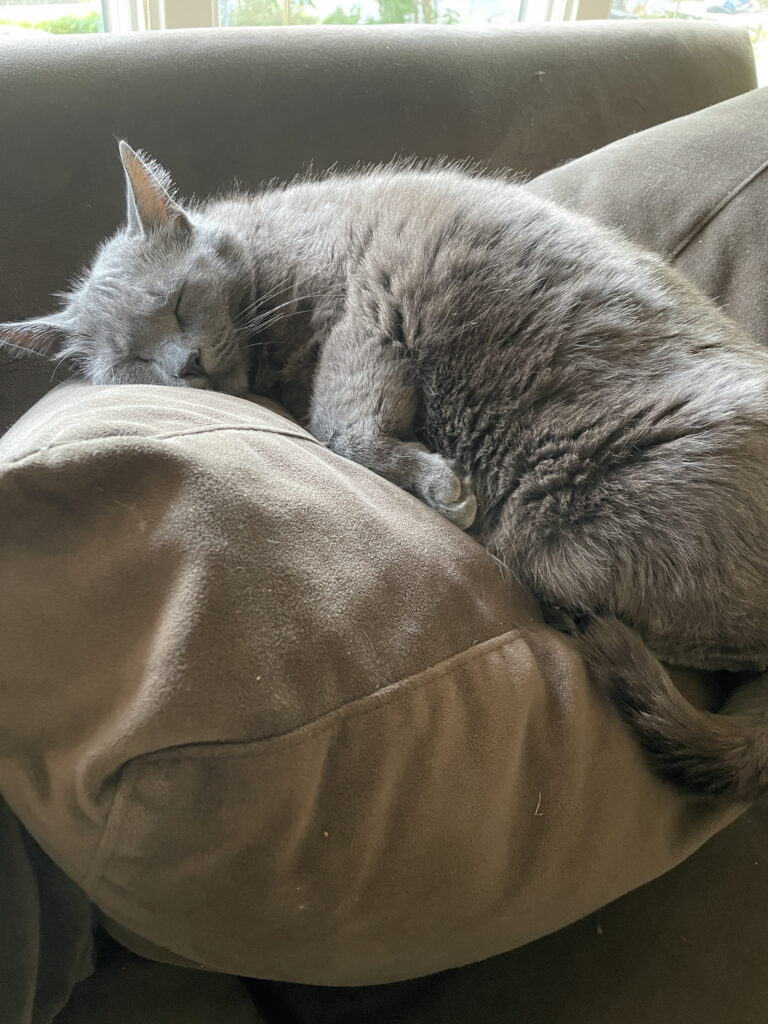
Animals and humans perform better when they have a consistent schedule to focus their minds.
©Patrick Siren/iStock via Getty Images
Cats love having a consistent routine and schedule. As territorial animals, they perform their hunting and protection duties better when they have routine exercise, hunting, grooming, and napping throughout the day.
Cat owners are well aware that when a routine changes, their cats get flustered and upset. This was prominent towards the end of the pandemic when remote workers were forced to go back into the office. Their cats were annoyed by the sudden change in schedule.
Cats learn their owner’s routines and keep them on their schedule as a method of taking care of them. They follow their owner’s schedule and imitate them to feel close and share those moments together. This is why many cats follow their owners into the bathroom to use their litter box at the same time or follow them into the kitchen for a shared breakfast. When the routine is broken, like when someone is trying to sleep in, the cat will meow, paw, and jump on the bed to wake their owners.
Having a routine is good to keep the mind sharp and focused. Cats know this and want to ensure their owners are not slouching on their regular schedule.
Effective Communication
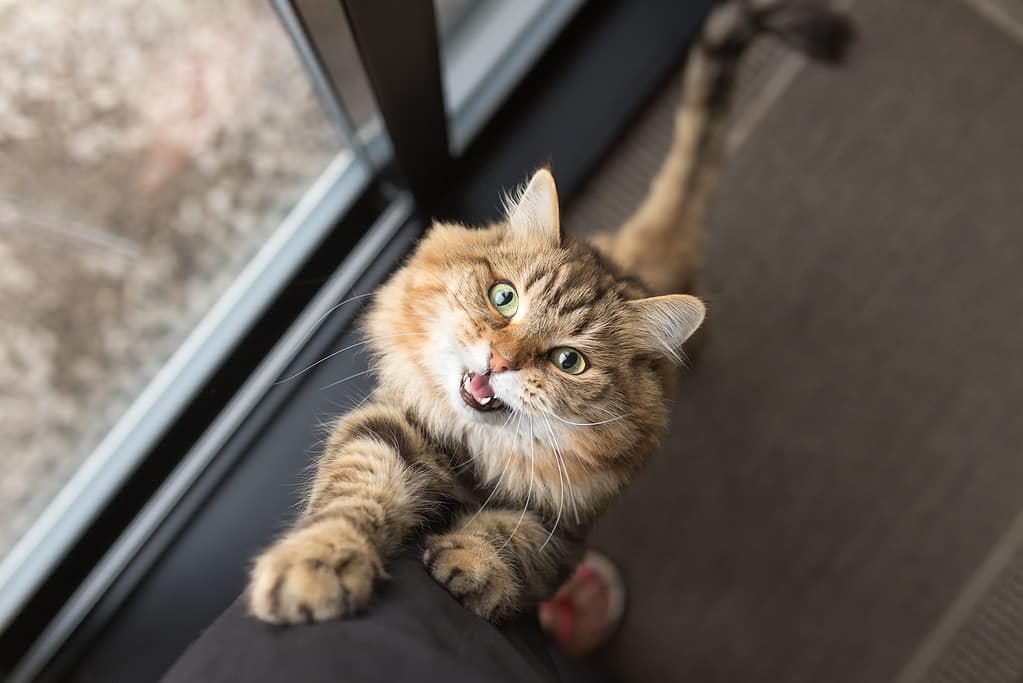
With over 100 ways to make sounds, cats have many options to saying they want attention and food.
©marieclaudelemay/iStock via Getty Images
Cats are capable of making over 100 sounds with their vocal cords. This gives them dozens of ways to communicate their wants and needs. Cats learn to mimic the sounds of their owners while walking around the house, sitting on the couch, or responding to other people in the house.
Imitating sounds is a tactical skill kittens learn to catch birds in the wild. When a cat is sitting at a window and making chattering sounds at the birds, that is a way of communicating to the birds it is safe to be around. With this adorable sound, they hope to lure the birds into striking distance.
They also adopt non-verbal cues to communicate with their owners. Some cats will learn to imitate hugging or holding hands by placing their paws on their owner to show love.
How Do Cats Imitate Humans?
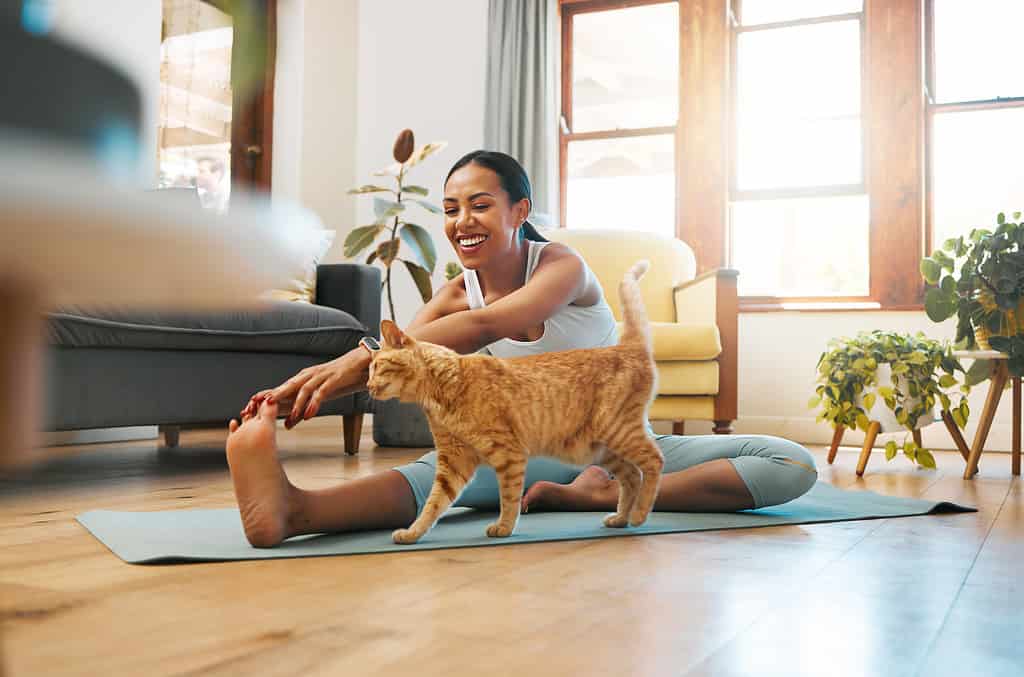
Felines will remind their humans of their daily yoga practice if that is part of a normal routine.
©PeopleImages/iStock via Getty Images
Cats use a variety of methods to imitate their owners. It all depends on how their humans express themselves and communicate. In fact, studies show that cats will imitate emotional cues and extroversion dependent on their humans. For instance, if an owner is extroverted and loves being social, the cat may also enjoy being around others. Inversely, if an owner is anxious and paranoid, the cat will adopt the anxious and paranoid attitude.
Some popular methods of cats imitating humans are:
- Using the bathroom at the same time
- Taking naps at the same time
- Using vocal cues like meows, chirps, and chatters to imitate their owner’s inflections and tones
- Willingness to socialize
- Openness to other people in the house
- Openness to go outside
- Neurosis levels from mild to chronic
- Curiosity of surroundings
Do Cats Mimic Other Animals?
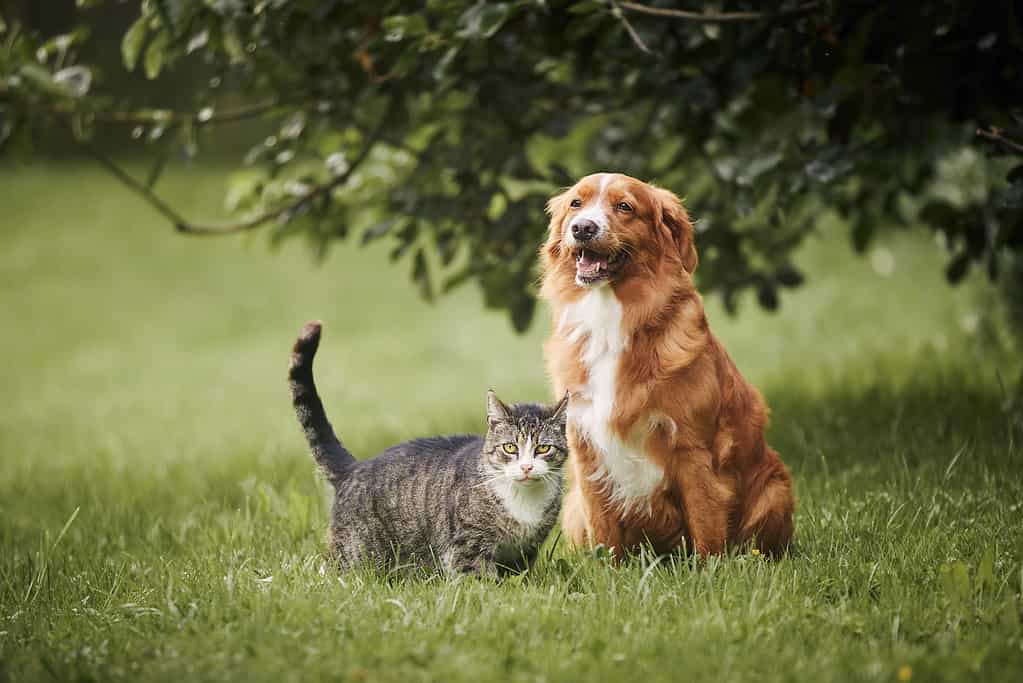
When raised together, cats and dogs may adopt traits from one another.
©Chalabala/iStock via Getty Images
Aside from mimicking their mothers and surrogate parents, cats mimic other animals in the vicinity. Pet owners who have a cat and dog will notice the cat may adopt dog-like traits as a method of bonding with his canine buddy. Some cats will act like dogs by getting messy, wanting to go outside for walks, or being as social as dogs.
As previously mentioned, cats also mimic the sounds of birds, chattering as they watch sparrows flit about at the window.
Additionally, cats may treat other animals like cats as a sign of affection. For example, a cat may groom their dog pal’s fur. Kittens are taught to groom themselves and their littermates as a sign of affection.
Interestingly, cats can also mimic snakes! Instinctively, cats know that snakes are frightening creatures and they have learned to adopt that trait as a self-defense mechanism. By pinning their ears back, showing their fangs, and hissing, cats look and sound remarkably similar to a hissing snake.
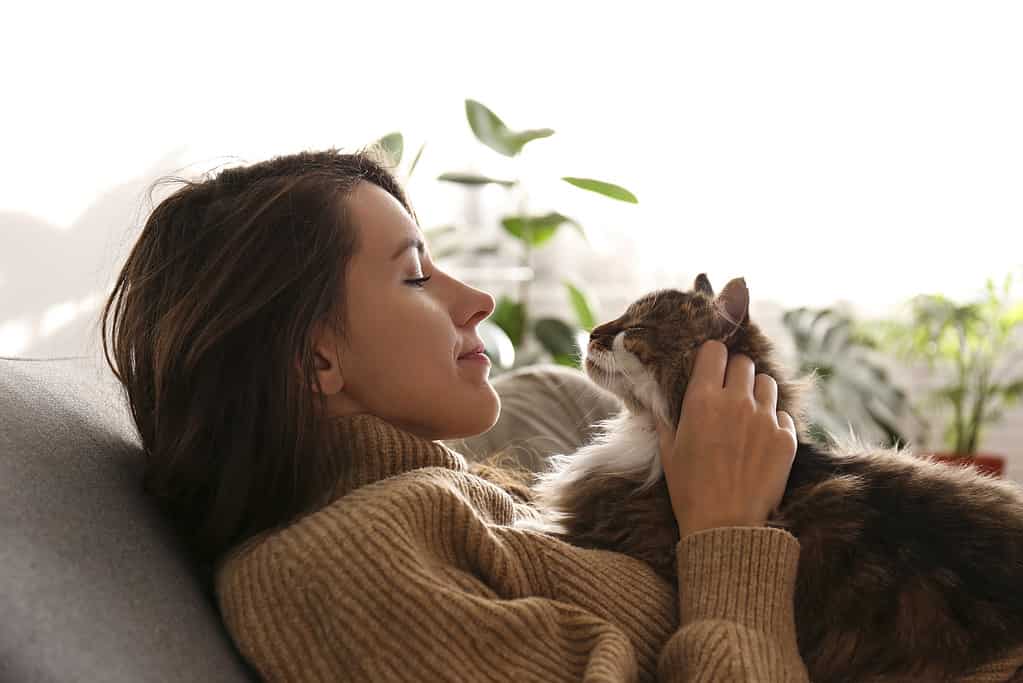
Cats are social animals and love to mimic those they love the most.
©Evrymmnt/iStock via Getty Images
In conclusion, cats imitate their owners because they love them. Cats may treat their humans like servants, but deep down they love and admire their owners for all the hard work they provide. Even when they act up by knocking things off the furniture, cats are doing it as a means to communicate their needs. See if you can spot the subtle ways your cat imitates you.
The photo featured at the top of this post is © Reshetnikov_art/Shutterstock.com
Thank you for reading! Have some feedback for us? Contact the AZ Animals editorial team.







